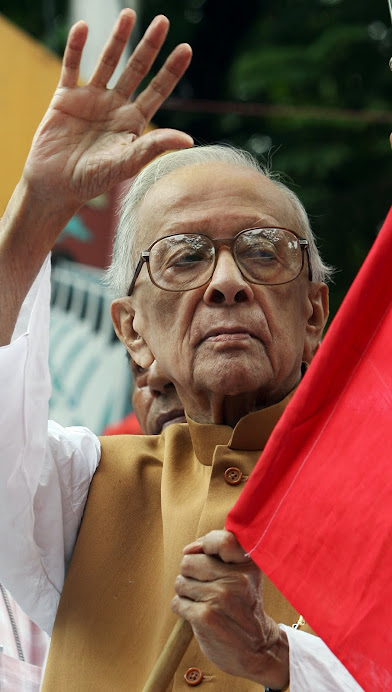Saugata Roy | TNN | Sep 5, 2016, 04.29 PM
IST
A Marxist, Jyoti Basu stayed way from the
funeral mass at Netaji Indoor Stadium, but attended mother's last journey.
How do a Catholic and a communist get
along,"people often wondered while discussing the mu tual respect that
Mother Teresa and Jyoti Basu had for each other. Basu was a Communist and
atheist. Mother was a Catholic nun with an unflinching belief in God. Yet,
Basu's doors were always open for Mother, who used to call on the chief
minister at Writers' Buildings without hesitation. Once, she was even allowed
to interrupt a cabinet meeting because she needed to meet Basu urgently.
"We share a love for the poor," Basu would say in reply to the query. In his book on the Mother, `Messiah of the Poor', B K Chaturvedi quotes Basu
as saying: "She makes me a bad Marxist since she makes me believe in
godliness."
When Mother addressed Basu, she would prefix `My
friend' before she took his name. The mutual understanding has a parallel in
Cuba, where Fidel Castro in 1992 welcomed churchgoing Catholics to join the
Communist Party of Cuba, shunning the "atheist" tag on communists.
Known as a liberal among Mar xists, Basu didn't give up his Marxist identity
though. He stayed away from the Mass before Mother's last journey at Netaji
Indoor Stadium, where dignitaries like US First Lady Hillary Clinton,
opposition leader Atal Behari Vajpayee had assembled to pay tribute. Basu joined
the programme only after the Missionaries of Charity spokesperson announced in
the stadium: "The Mother will now begin her last journey".
A retired state bureaucrat recoun ted how Basu
worked from behind to give Mother Teresa a fitting farewell.He micro-managed
the entire programme and also gave the Missionaries of Charity the go-ahead to
keep her remains at Mother House, something that usually doesn't happen under
the law.
In the book `Seeking Christ in the Crosses &
Joys of Aging', Ronda Chervin recounts an incident when Basu called up the
Mother asking her to provide a home for some destitute women who were
languishing in prison for the want of a better place. She immediately took in
40 and provi sions were made to build a home for them on the land provided by
the government.
Former election commissioner Navin Chawla, who
was Mother's biographer, recounts how on one occasion when Mother was visiting
Delhi, she fell ill and had to be admitted to a hospital. For a week that she
was there, Chawla recalls, Basu called every day . When she was hospitalised in
Kolkata, Basu would discreetly drop by and speak to the doctors.
It must be sheer providence that Mother House
and Pramode Dasgupta Marxist Education Centre exist cheek by jowl. While the
former was Mother Teresa's residence and continues to be the nunnery where
relatively new entrants to the Missionaries of Charity are trained, the latter
is, as the name suggests, a centre that trains comrades.



